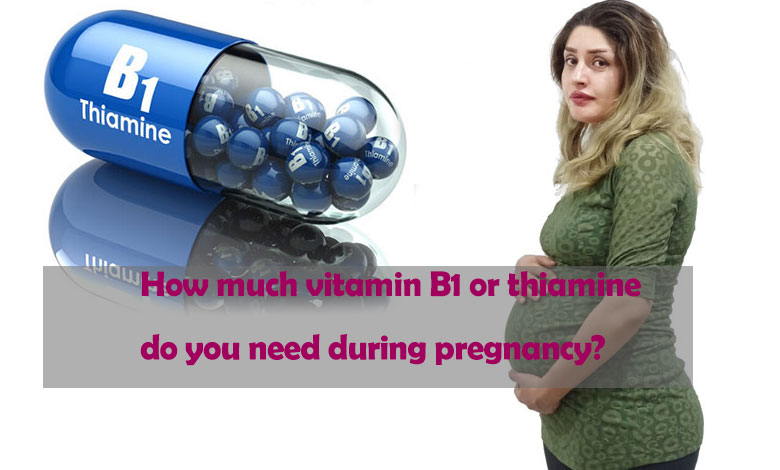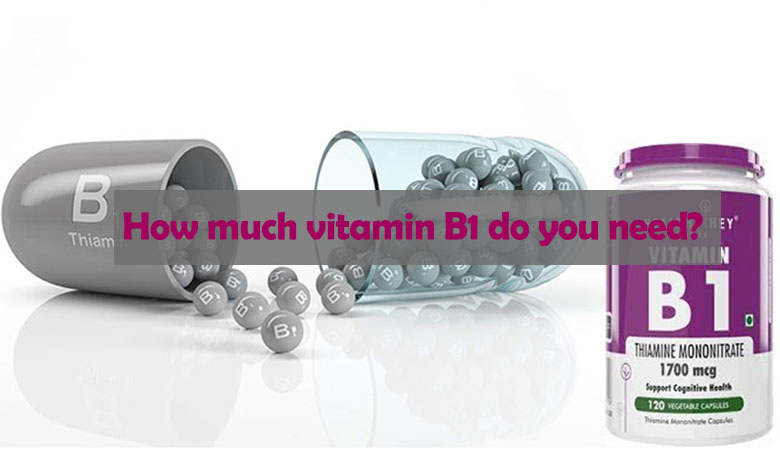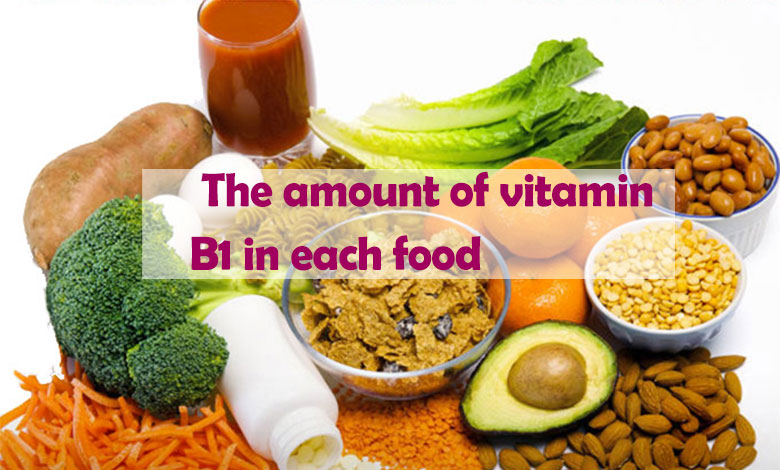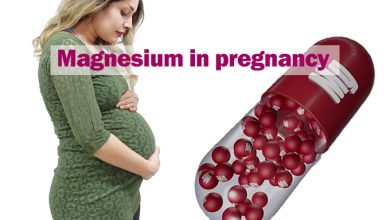How much vitamin B1 or thiamine do you need during pregnancy?

Vitamin B1, also known as thiamine, is responsible for many important functions in the body during pregnancy. Whole grain products, enriched bread, peas, dried beans, and some fish are sources of vitamin B1.
Related article: when to start taking prenatal vitamins
Vitamin B1 (thiamine)
Vitamin B1, also known as thiamine, is responsible for many important functions in the body during pregnancy.
- Helps you and the fetus convert carbohydrates into energy.
- Plays the main role in fetal brain development.
- Helps muscles, the nervous system, and the heart to function normally.
How much vitamin B1 do you need?
The daily recommendation for receiving vitamin B1 is 1.4 mg regardless of the mother’s age. Pregnant mothers with multiples should increase their thiamine intake.
Related posts: Vitamin B6 in pregnancy

Sources of vitamin B1
Thiamine is found in a variety of foods. Whole grain products, enriched bread, peas, dried beans, and some fish are sources of vitamin B1. Dairy products, fruits, and vegetables also contain vitamin B1, but very little.
The amount of vitamin B1 in each food
- Three-quarters cup of whole grains: 1.5 mg
- A cup of cooked white rice: 1.2 mg
- 1/4 cup of American walnuts: 0.4 mg
- 1/4 cup of Brazil nuts: 0.4 mg
- 1/2 cup of cooked lentils: 0.2 mg
- 1/4 cup of wheat: 0.5 mg
- 1/2 cup of cooked cobs: 0.2 mg
- A cup of spinach: noodles 0.3 mg
- Three ounces of salmon: 0.3 mg

What happens if we don’t get enough vitamin B1 during pregnancy?
Vitamin B1 deficiency includes nausea, fatigue, nerve damage, and headaches. Severe vitamin B1 deficiency causes Beriberi disease. Beriberi is a disease that causes poor blood circulation and inflammation, leading to heart failure.
Thiamine deficiency is commonly seen in developing countries that use processed rice. In processed rice, the outer coating of the rice is removed and it becomes processed. In industrialized countries, alcohol is considered to be the main cause of vitamin B1 deficiency, as alcohol greatly affects the absorption of thiamin in the body.
In developed countries such as the Americas, foods are often fortified with vitamin B1 and thus vitamin B1 deficiency is rarely seen in these countries.
What happens if we absorb too much vitamin B1?
There is no evidence that excessive vitamin B1 absorption during pregnancy has any side effects. Maintaining a healthy, balanced diet is important at all stages of life. But when you’re pregnant, you have more reasons to take care of your body and ensure your health.
B-group vitamins often referred to as B-complex vitamins, have special and important nutritional aspects during pregnancy.
Among the many B vitamins, vitamins B6, B9, and B12 are helpful in minimizing the risk of birth defects and relieving some pregnancy symptoms.
In the rest of this article, we will talk about the role of vitamin B in pregnancy. This is why it is so important that taking quality prenatal vitamins is a great way to ensure that you get all the healthy vitamins for your baby and have a healthy pregnancy.
The Role of vitamin B in a healthy pregnancy
The B complex consists of eight vitamins that play an important role in the health of the body, especially during pregnancy and fetal development.
During the first and third trimesters, most women feel tired and have low energy. Foods rich in vitamin B helps increase energy naturally and have a number of properties for the fetal body
. Therefore, knowing the role of vitamin B in pregnancy and fetal development can clarify the importance of eating foods rich in this vitamin, however, the best way to absorb these nutrients is by eating foods rich in the vitamin. But if your doctor diagnoses it, you can also use supplements.
Since thiamine plays an important role in your baby’s brain development, you should consume 1.4 mg of vitamin B1 per day. Below we present natural sources that contain vitamin B1.
Therefore, combining these foods and adding them to your pregnancy diet is very important for your baby’s growth and brain development.
What are the food sources of thiamin?
Fortified breakfast cereals and bread, whole grain products, beans, and peas all contain good amounts of thiamin. Fruits, vegetables, and dairy products also have small quantities. Here’s a look at the amount of thiamin in some of these foods:
- A glass of wheat germ breakfast cereal, toasted: 1.88 mg
- A glass of wheaten enriched with thiamine: 0.31 mg
- Half a cup of green peas, cooked: 0.21 mg
- One cup of brown rice, cooked: 19.0 mg
- 28 grams of walnuts: 19.0 mg
- Half a cup of lentils, cooked: 0.17 mg
- A medium orange: 0.11 mg
- Half of a small cantaloupe: 0.11 mg
- A glass of milk: 0.1 mg
- A slice of whole wheat bread: 0.1 mg
- Half a cup of spinach, cooked: 0.09 mg
- One large egg, hard-boiled: 0.03 mg
How much thiamine do you need?
Non-pregnant, pregnant, and lactating women need thiamine in the following amounts:
Why do you need Thiamine during pregnancy?
Should you take thiamine supplements while pregnant?
What are the symptoms of thiamine deficiency?
Thiamine deficiency is more common in countries where people’s diets consist mainly of white rice. Thiamine is present in the outer layer of rice, which is usually removed during processing. Alcoholism is also a major cause of thiamine deficiency because alcohol makes it difficult for the body to absorb thiamine.
The primary symptoms of thiamine deficiency include weakness, nausea, and fatigue. Severe thiamine deficiency, also called beriberi, causes difficulty walking, numbness in the hands and feet, loss of muscle function or paralysis in the legs, confusion, i.e. confusion and loss of consciousness, speech problems, increased heart rate, and shortness of breath during activity.
In conclusion, vitamin B1 or thiamine is essential during pregnancy to support the growth and development of the fetus, as well as to maintain the health of the mother. The recommended daily intake of thiamine during pregnancy is 1.4 mg, which can be achieved through a balanced diet that includes thiamine-rich foods such as whole grains, legumes, and nuts. Women who are at risk of thiamine deficiency due to factors such as alcoholism or malnutrition may require higher doses of thiamine supplements under the guidance of a healthcare professional. Overall, ensuring adequate thiamine intake is an important aspect of prenatal care that can help promote a healthy pregnancy and prevent complications.
